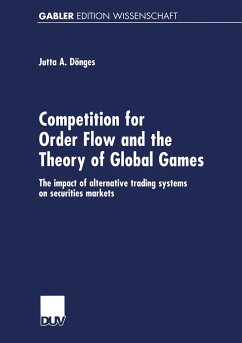The proliferation of alternative trading systems has increased competition for order flow in financial markets significantly and renewed the debate on fragmentation versus consolidation. Market microstructure models that analyze liquidity-based intermarket competition typically exhibit multiple equilibria, making it difficult to determine whether fragmentation or consolidation of order flow will occur.
Jutta A. Dönges applies the recently developed theory of global games that
reduces multiplicity of equilibria in coordination games to a model of intermarket competition and demonstrates the existence of a unique equilibrium under fairly general conditions. The author investigates whether and under which circumstances alternative trading systems, particularly crossing networks, can co-exist with established markets or even replace them and explores how the introduction of a crossing network affects both
monopolistic and competitive dealer markets and the market participants'
behavior.
Jutta A. Dönges applies the recently developed theory of global games that
reduces multiplicity of equilibria in coordination games to a model of intermarket competition and demonstrates the existence of a unique equilibrium under fairly general conditions. The author investigates whether and under which circumstances alternative trading systems, particularly crossing networks, can co-exist with established markets or even replace them and explores how the introduction of a crossing network affects both
monopolistic and competitive dealer markets and the market participants'
behavior.








